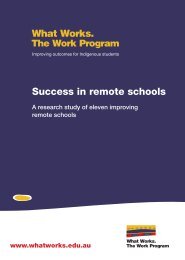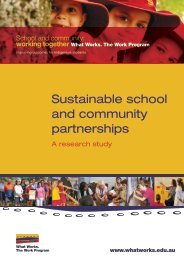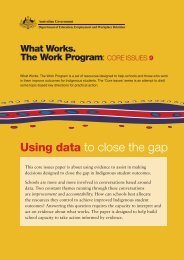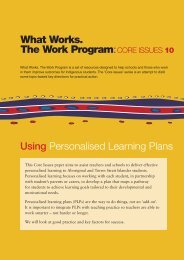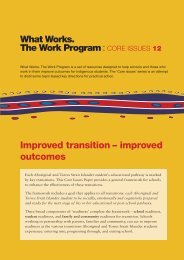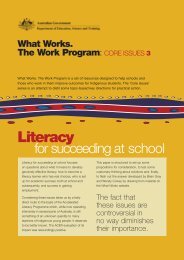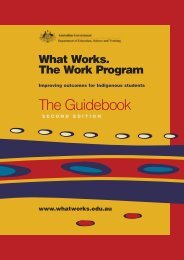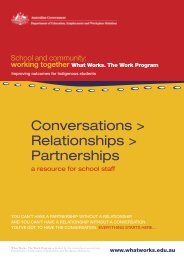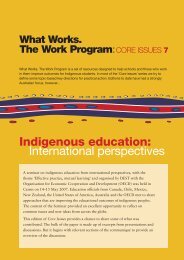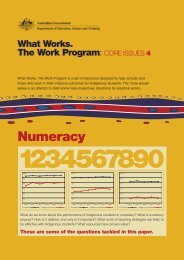STUDIES OF SOCIETY AND ENVIRONMENTSystems Resources <strong>and</strong> PowerConcept In Year 1the student:In Year 2the student:In Year 3the student:In Year 4the student:In Year 5the student:In Year 6the student:In Year 7the student:In Year 8the student:In Year 9the student:Citizenship <strong>and</strong>GovernmentRules <strong>and</strong> laws – theLegislative system.• Knows that rules tell youwhat you should <strong>and</strong>shouldn’t do.• Responds to simple rulesat school.• Can say some of the rulesthat exist in their home(e.g. says “ we have a rulethat we are not allowed togo swimming straight afterdinner”).• Knows that there areconsequences if they‘break the rules’.• Knows that rules have tobe followed <strong>and</strong> there areconsequences if theyaren’t (e.g. knows thatthey will get into troublefrom the teacher if theybreak the rule ‘don’t leavethe room withoutpermission’).• Identifies rules <strong>and</strong>responsibilities ofmembers of the schoolcommunity, (e.g. says“everyone has to turn offthe tap after they havewashed their h<strong>and</strong>s”).• Knows some of the rulesof the community (e.g.‘dogs must be kept on alead in public places’, or‘don’t leave litter on thebeach’).• Knows that if they breakcommunity rules they mayget a fine or some otherpunishment.• Gives examples of rulesapplied within families,classrooms, schools <strong>and</strong>identify theirfunction/purpose, (e.g.says “a rule we have athome is don’t talk whenyou mouth is full <strong>and</strong> thisis so that people can’t seefood in your mouth”).• Contributes to discussionsin developing rules,considering fairness (e.g.says “we can’t have a rulethat lets the tallest peopleget their lunch firstbecause that is unfair”).• Recognises communityexpectations often outlinedin codes of behaviour <strong>and</strong>rules.• Discusses the purpose ofrules (e.g. knows that rulesgovern how sport isplayed; knows that rulesguide drivers on the road;knows the role rules playin the school community).• Identifies consequenceswhen people break rules<strong>and</strong> considers how peoplemake amends, (e.g. says “Iwas rude to my teacher soI had to say sorry <strong>and</strong> mypunishment was that Icouldn’t go to drama classthis week”).• Recognises that rules maybe considered ‘fair’ <strong>and</strong>‘unfair’ from a range ofperspectives (e.g. knowsthat some rules mayadvantage some people<strong>and</strong> disadvantage others).• Knows the differencebetween a rule <strong>and</strong> a law.• Underst<strong>and</strong>s that groups<strong>and</strong> communities interactaccording to rules (e.g.having listened to storiesthat illustrate codes ofconduct – such as Aesop’sFables, AboriginalDreaming stories <strong>and</strong> theBible, identifies the ‘rules’inherent in them).• Describes what mighthappen if people don’tobey the laws in society(e.g. if people don’t driveon the left h<strong>and</strong> side of theroad or stop at stop signs).• Knows what it means to‘break the law’.• Knows that every countryhas their own set of laws• Knows that some laws arespecific to the state ofQueensl<strong>and</strong> <strong>and</strong> others toAustralia.• Knows that some groupsin society have ‘socialrules’ that other groupsdon’t have (e.g. puttingyour h<strong>and</strong> over yourmouth when you cough orsaying ‘thank you’ whensomeone gives yousomething). HPE• Explores why society haslaws <strong>and</strong> examines whathappens when peoplebreak laws.• Explores whetherpunishment is always themost appropriateconsequence when a ruleor law is broken <strong>and</strong>considers other ways inwhich people can makeamends.• Discusses rules <strong>and</strong> lawsthat affect young people<strong>and</strong> assess these accordingto fairness <strong>and</strong>appropriateness.• Identifies key personnelwithin the legal systemwho help to protectpeople’s rights• Underst<strong>and</strong>s that aconstitution is an agreedset of rules of guidelines<strong>for</strong> an organisation.• Recognises that the lawsof other countries apply toAustralians when theytravel overseas.• Knows what a constitutionis (e.g. examines theconstitution <strong>for</strong> the localfootball club).• Knows that changes ininternational law mayaffect Australian law.• Underst<strong>and</strong>s that rules <strong>and</strong>laws result from decisionsabout rights <strong>and</strong>responsibilities.• Knows that the AustralianConstitution can bechanged through areferendum.• Knows the elements ofAustralia’s law <strong>and</strong> itsdevelopment.• Knows that laws arewritten by parliaments orthrough decisions made bytheir courts over time (e.g.the driving age <strong>and</strong> bloodalcohol limits).• Knows that laws maychange over time throughamendments.• Reflect on ways in whichchanging values caninfluence the law (e.g.smoking in public).• Recognise the role of thecourt system (includingfamily court, districtcourts, children’s courts,Magistrates) in upholdingthe law <strong>and</strong> democraticrights (freedom of speech,of the media, of religion,of association).• Underst<strong>and</strong>s that Australiahas a constitution thatdescribes the key featuresof the Federal system ofgovernment <strong>and</strong> can beamended by referendum.• Recognises that Australiais a signatory to a range ofinternational agreementsthat influence Australianlaw.• Knows about the role ofthe High Court ofAustralia.• Knows the elements of a‘fair trial’ <strong>and</strong> that peopleare ‘presumed innocent’until proven guilty.• Describes how laws aremade, administered <strong>and</strong>en<strong>for</strong>ced.• Relates some instanceswhere the justice systemmay have provided aseemingly ‘unjust’outcome (e.g. where oneperson may receive atougher sentence thananother person whocommitted the samecrime, in another city).• Knows about ‘humanrights’ <strong>and</strong> can talk aboutthese in various contexts(e.g. human rights ofIndigenous people overtime in Australia).• Identifies different levelsin legal structures <strong>and</strong> thecontributions they make tothe legal system(including district courts<strong>and</strong> Supreme Court).• Knows the principles oflaws includingindependence of thejudiciary, equality be<strong>for</strong>ethe law <strong>and</strong> innocent untilproved guilty.• Considers the role ofgovernment in developingpolicy <strong>and</strong> <strong>for</strong>mulatinglegislation.• Recognises that there aredifferent types of law (e.g.criminal <strong>and</strong> corporate).• Explores principles ofjustice includingindependence of thejudiciary, equality be<strong>for</strong>ethe law, presumption ofinnocence, the right ofappeal <strong>and</strong> restorativejustice.• Recognises that theAustralian Constitutionestablishes the powers <strong>and</strong>responsibilities of thenational parliament <strong>and</strong>the federal legal systemincluding the High Court.• Evaluates theeffectiveness ofinternational organisationsin protecting human rights(e.g. AmnestyInternational, UnitedNations).Rights <strong>and</strong>responsibilities• Identifies some rights <strong>and</strong>responsibilities of studentsin their class <strong>and</strong> in theschool (e.g. knows theyhave a right to feel safe<strong>and</strong> not be bullied). HPE• Displays personal rights<strong>and</strong> responsibilities asstudents, members of asporting team, or membersof the community (e.g.knows that as a member ofa sporting team aresponsibility is to trainwith the team <strong>and</strong> be ontime to play in the game<strong>and</strong> a right is to be treatedwith respect as a teammember). HPE• Identifies some rights <strong>and</strong>responsibilities of citizensin their local community(e.g. knows that everyonehas the right to use thetown library <strong>and</strong> that theresponsibility that goeswith that is to look afterthe books <strong>and</strong> let otherpeople read quietly).• Knows that somecommunity rules are abouthaving a responsibility tothe community (e.g. thepark/beach belongs to allthe people in thecommunity so we have aresponsibility to all keep itclean <strong>for</strong> everyone). HPE• Recognises that rightscome with responsibilities(e.g. if we want to usepublic recreation areas <strong>for</strong>enjoyment we have aresponsibility to help keepit clean) <strong>and</strong> that if wedon’t carry out ourresponsibilities there areconsequences (e.g. thepublic area may beclosed). HPE• Recognises discriminatingbehaviour (such astreating people differentlybecause they havedifferent coloured skin ortalk differently) <strong>and</strong>describes how this affectsthe rights of others (e.g.says “girls have as muchright as boys to playfootball at school”). HPE• Knows about ‘democraticrights’ <strong>and</strong> what they arein Australia includingfreedom of speech, of themedia, of religion <strong>and</strong> ofassociation.• Knows that rights helpprotect citizens fromexploitation <strong>and</strong> abuse.• Underst<strong>and</strong>s that rules <strong>and</strong>laws result from decisionsabout rights <strong>and</strong>responsibilities (e.g.knows that the purpose oflaw-making is to protectpeople <strong>and</strong> their property).• Explores the rights ofcitizens in ancient <strong>and</strong>historical societies (e.g.Ancient Greece, AncientRome, Ancient China).• Considers some rights <strong>and</strong>determine whether theresponsibilities that gowith them are fair.• Knows about ‘humanrights’ <strong>and</strong> can talk aboutthese in various contexts(e.g. human rights ofIndigenous Australianover time).• Knows what it means to‘think global, act local’ inthe context of Australiancitizens’ responsibilities inenvironmental issues suchas water usage. Sc• Defines, exercises <strong>and</strong>evaluates rights <strong>and</strong>responsibilities associatedwith being a young adultincluding the concept of‘working together <strong>for</strong> thecommon good’.• Underst<strong>and</strong>s that thefeatures of political <strong>and</strong>legal systems adapt toensure people’s rights <strong>and</strong>responsibilities.• Examines the rights <strong>and</strong>responsibilities of theworld’s countries in thecontext of globalwarming, nuclear weaponscapability, <strong>and</strong> otherglobal issues. Sc<strong>Bound</strong> <strong>for</strong> <strong>Success</strong> <strong>Scope</strong> <strong>and</strong> <strong>Sequence</strong> <strong>Statements</strong> V2 Page 73 Working Document Semester One 2007
STUDIES OF SOCIETY AND ENVIRONMENTSystems Resources <strong>and</strong> PowerConcept In Year 1the student:In Year 2the student:In Year 3the student:In Year 4the student:In Year 5the student:In Year 6the student:In Year 7the student:In Year 8the student:In Year 9the student:Participative decisionmaking• Makes choices ordecisions about theiractions (such as what toeat <strong>for</strong> lunch, how to helpfamily or class members).HPE• Makes decisions withclassmates <strong>for</strong> somethingthat they all want (e.g.agrees to work quietly sothey can finish early).• Participates in democraticdecision-making (e.g. talksabout rules <strong>for</strong> theclassroom or votes toselecting a team leader).• Makes decisions in groupsto achieve common goals<strong>for</strong> an environmental orcivic action, (e.g. decideswith classmates to care <strong>for</strong>bushl<strong>and</strong> or a part of theschool grounds). Sc• Identifies <strong>and</strong> discussesexamples of situationswhere people have a directsay <strong>and</strong> situations whereothers make decisions ontheir behalf (e.g. says “Iam allowed to go to bedwhen I like on the weekendbut during the week Mumsays I have to be in bed by8.00pm”).• Knows what theQueensl<strong>and</strong> Governmentis <strong>and</strong> what it does.• Gives examples ofgovernment organisations<strong>and</strong> non-governmentorganisations in theircommunity.• Talks about school rules(including the code ofconduct) <strong>and</strong> underst<strong>and</strong>sprocesses <strong>for</strong> their<strong>for</strong>mulation <strong>and</strong> review.• Underst<strong>and</strong>s the role oflocal government inmaking rules e.g. aboutwaste management, petcare <strong>and</strong> the use of localparks.• Knows what a petition is.• Describes the way that thestudent representativegroup in their schoolmakes decisions.• Analyses how individuals,organisations <strong>and</strong>governments can be globalcitizens (e.g. everybodycan use less water, usepublic transport). Sc• Explores the role ofgovernment in makingdecisions.• Identifies work that peoplecan do together incommunities <strong>and</strong> exploreshow shared values canhelp resolve conflict orachieve consensusbetween diverse views(e.g. different religiousgroups coming together todiscuss how they can care<strong>for</strong> the environment).• Knows what a referendumis <strong>and</strong> can give someexamples of instanceswhere these have beenheld in Australia.• Identifies <strong>and</strong> classifiesdecisions that are made bythe Queensl<strong>and</strong>Government in areas suchas health, education,infrastructure <strong>and</strong>discusses which decisionsmade by the Queensl<strong>and</strong>Government will affectthem in their localcommunity.• Considers the purpose of ademocratic civil society<strong>and</strong> discusses how it canbe achieved (e.g. how weare governed, how wetreat each other, thesociety we aspire to).• Identifies howgovernments makedecision <strong>and</strong> exploresways in which thesedecisions impact onpeople.• Identifies ways that peopleattempt to influencegovernment decisions (e.g.rally, media campaign,petition, hunger strikes)<strong>and</strong> how these varydepending on which levelof government they aretrying to influence.• Identifies howgovernments have beeninfluenced by people suchas Gh<strong>and</strong>i, M<strong>and</strong>ela, Bono<strong>and</strong> describes the methodsthat these people used.• Develop skills incollective decisionmaking<strong>and</strong> in<strong>for</strong>medcivic action (e.g. contactlocal member, join asupport group, participatein town-hall meetings,civic petition, letterwritingcampaigns, seekelection to public office).• Develop skills to becomeinvolved in or influencerepresentative groups inthe school community.• Recognises that citizenscan individually <strong>and</strong>collectively influencedecision-making.• Investigates ways inwhich non-governmentorganisations cancontribute to communities<strong>and</strong> influence governmentdecisions.Elections <strong>and</strong> voting• Can describe instanceswhere they take part in a‘class vote’ or ‘familyvote’ (e.g. says “Mr Smithsaid to put our h<strong>and</strong> up ifwe wanted to go <strong>for</strong> a walk<strong>and</strong> all of us did except <strong>for</strong>Sam so we did”).• Knows how voting works<strong>and</strong> votes <strong>for</strong>representative (e.g. drawsa ballot paper <strong>and</strong>conducts a class election<strong>for</strong> a leader or monitor).• Makes decisions withclassmates <strong>for</strong> somethingthat they all want (e.g.agrees to work quietly sothey can finish early).• Draws a ballot paper <strong>and</strong>conducts an election ofclass leader or votes tofind the most populartuckshop food.• Explains how voting isused to make decisions<strong>and</strong> select leaders (e.g.says “we all wrote onpiece of paper the name ofwho we wanted to be theclass leader <strong>for</strong> term 2 <strong>and</strong>the one with the most votesgot to be ‘it’”).• Identifies when electionsin their community areheld <strong>and</strong> can describe howthe election worked, whovoted <strong>and</strong> the outcome(e.g. says “last night thefooty club voted <strong>for</strong> a newcaptain; everyone in theteam got to have one voteeach <strong>and</strong> we all put theperson’s name we wantedon a piece of paper <strong>and</strong>the person with the mostvotes was made thecaptain”).• Underst<strong>and</strong>s the purposeof elections <strong>and</strong> theresponsibilities of electedrepresentatives (e.g.knows that the captain ofthe school footy team isresponsible <strong>for</strong> makingsure everyone knowswhen training is on,collecting the footyjumpers at the end of thegame <strong>and</strong> telling peoplewhat to do on the field).• Knows that elections areused to elect governments;knows their local memberof Parliament <strong>and</strong> localcouncillor <strong>and</strong> that thesepeople represent theirparents (constituents) atparliamentary <strong>for</strong>ums.• Knows when <strong>and</strong> howlocal governmentelections are held <strong>for</strong> theirlocal area <strong>and</strong> what theelected people do <strong>for</strong>them.• Knows that whole-of-Australia elections <strong>and</strong>Queensl<strong>and</strong> elections areheld every 3 years <strong>and</strong> c<strong>and</strong>escribe how the electionis run includingelectorates, the setting upof polling booths, secretballot, crossing off ofpeople’s names as theyvote, counting of votes,absentee votes, donkeyvotes).• Knows that all 18-yearoldsin Australia arerequired to vote in federal<strong>and</strong> state governmentelections, that they mustregister to vote <strong>and</strong> thatthere are fines if theydon’t vote.• Knows that preferentialvoting is used <strong>for</strong> theHouse of Representativeswhile proportional votingis used <strong>for</strong> the Senate.Leaders• Recognises leaders in thefamily <strong>and</strong> school (father,mother, principal, schoolcaptain, sporting teamcaptain).• Identifies the role ofleaders within acommunity, includingschool, community group,local community <strong>and</strong>nation (e.g. knows that theprincipal <strong>and</strong> councillorare leaders <strong>and</strong> that werespect their authority).• Identifies leadershipresponsibilities (e.g. says“he was in charge so wedid what he said”.• Knows that heroes can beleaders because we might‘want to be like them’(e.g. sport figures, musicstars, actors).• Describes some of thetactics that good leadersuse to influence others(e.g. speak calmly toindividuals to make sureevery one underst<strong>and</strong>stheir job; encourageseveryone).• Knows that leaders downthrough history haveinfluenced <strong>and</strong> shaped thehistories of countries <strong>and</strong>described how they didthat.• Identifies different typesof leaders in Australia’shistory (e.g. politicalleaders, activist leaders,cult leaders) <strong>and</strong> describeshow they led people.• Identifies different typesof leaders in the world’shistory (e.g. social rightsleaders, human rightsleaders, governmentstatesmen, politicalleaders).• Evaluates the power,responsibilities <strong>and</strong>influences exercised bypolitical leaders <strong>and</strong>elected representatives.<strong>Bound</strong> <strong>for</strong> <strong>Success</strong> <strong>Scope</strong> <strong>and</strong> <strong>Sequence</strong> <strong>Statements</strong> V2 Page 74 Working Document Semester One 2007



